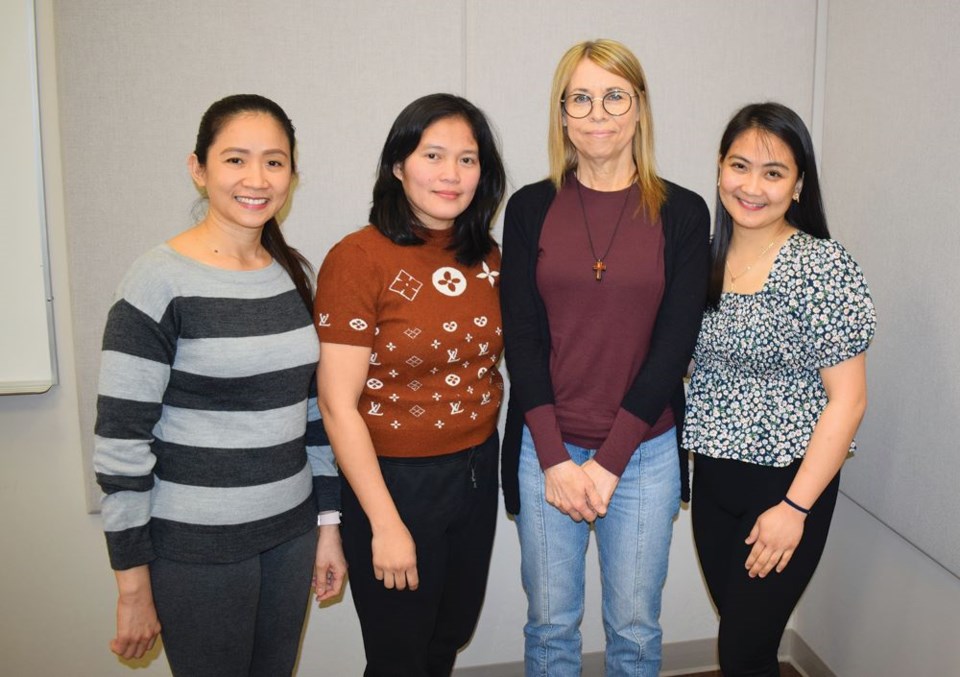ESTEVAN - A continuing care assistant (CCA) program at the С����Ƶeast College’s Estevan campus has proven to be a great training ground for the students enrolled, including some from the Philippines.
Eleven people are registered in the program, including four international students. It is an eight-month course that started in September and wraps up on May 6. All of the students have been hired for jobs once the program is finished.
The students recently had a clinical program through the Estevan Regional Nursing Home, which resulted in a great experience. Those who didn’t have jobs prior to the clinical session were offered employment by the nursing home once the program was complete.
“Clinical experience is when we go out for 105 hours to somewhere in the community and start to show off our skills,” said instructor Vanessa Butler. “Our skills at the nursing home would be helping the seniors with their daily routine, things like bathing, things like assisting with meals, things like that.”
The 105 hours were spread out of over three weeks.
Another clinical session will start on April 11 and will occur at St. Joseph’s Hospital’s long-term care.
When they aren’t in clinical sessions, the students have been in the classroom.
“There was a lot of theory and there was also lab skills, so the lab skills, the hospital gave us two rooms up there at Unit A, and we were able to go up there and learn on mannequins and learn how to do these lab skills, and sometimes [practise] on each other,” sad Butler.
CCAs are in high demand in the region, Butler said.
Jonalyn Santos said she has learned a lot through the course. This marks her first foray into the medical field. While she was in the Philippines, she spent seven years working on a cruise ship. When she came to Canada, she decided to start working as a CCA.
“We’re taking care of the elderly,” said Santos. “It’s different now, but I love it, so when we went to our clinical session, I learned how to take care of the elderly, to prepare them for the morning, how to feed them and how to clean them.”
They have learned how to communicate with seniors and to talk to them nicely.
Santos said it’s good that she was able to get to know some of the residents during her clinical stay. When she went back to the ERNH after her clinical session ended, some of them recognized her and wanted to know if she was there for work or for a visit.
“When we were starting the course, I could not do that or I could not do this, but for the clinical one, [I thought] if you just learn everything, you will do the job,” said Santos.
Imele Virador was a registered nurse in the Philippines before she came to Canada, so she brings a background in healthcare to the program.
“My family is surrounded with medical professionals,” sad Virador. “My mother is a mid-wife, my sister s a nurse, my other sister is a pharmacist, my aunties are … nurses,” said Virador.
She wanted to get back to work in healthcare, and the CCA course was a good opportunity.
Her orientation at the nursing home will happen next month.
“The clinical was fun and memorable. At the same time, I am learning a lot,” said Virador. “It’s different.”
She has noticed a lot of differences between the elderly in the Philippines and Saskatchewan.
The staff at the nursing home was very helpful, teaching the clinical students techniques to provide care.
She is looking forward to seeing the ERNH’s residents once again.
The CCA program has been a good reminder of some of the things she learned in college, but there are other items she hadn’t heard until now.
Erika Valencia was an office administration clerk when she lived in the Philippines. But she wanted to try a challenging new career in Canada.
“I wanted to move around, using all of my strength. That’s why it’s interesting working in health care, because I think that it’s more challenging working in health care than working in clerical things,” sad Valencia.
Her parents are getting older, and so she wanted to know how to care for the elderly.
“In the Philippines, we don’t have home care like you have here in Canada, and in the Philippines, mostly the children of the elderly people are the ones who took care of them until the day they’re gone. I wanted to know how to provide a proper care for them.”
Once she is finished, she believes it will also benefit her parents.
The program has been good from the outset. Valencia said Butler has been very approachable and understanding if there has been a language barrier. A good bond has been formed among the 11 students.
The clinical experience was very good and helped them a lot, she said. It gave them a chance to apply what they had learned beyond the laboratory session.
“When we’re in the clinical setting, it’s all different because you have to really take care of them because they’re real people and they are very vulnerable,” said Valencia.
Butler is a registered nurse who worked at St. Joseph’s Hospital. When she shifted to the college in 2011, her transition was gradual because she had young children and she wanted to work Monday-Friday.
This is the first year the program has been instructor-led, Butler said. The college used to send students with a preceptor and Butler would check in, but for 2022-23, Sask. Polytechnic has changed it to instructors at the helm, which means she is with the students all the time.
“We really appreciate the community,” said Butler. “We appreciate that they’re always helping us to learn, they’re always willing to take our students in and be preceptors to them.”
The health-care facilities don’t have to accept the students so willingly, and Butler is thankful for their support.






